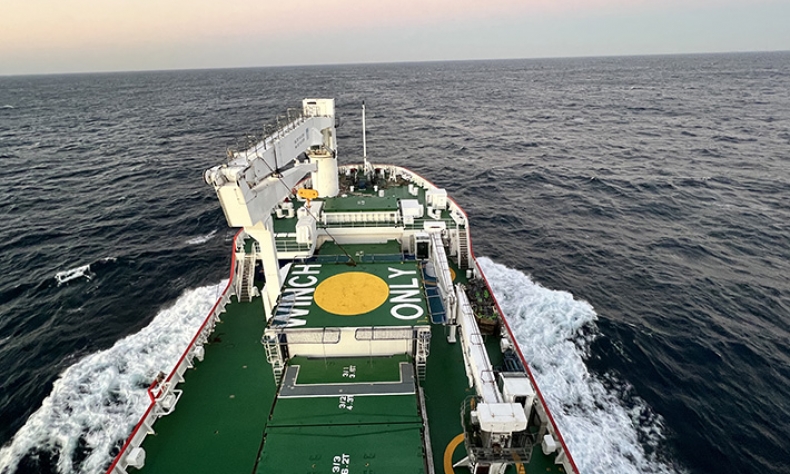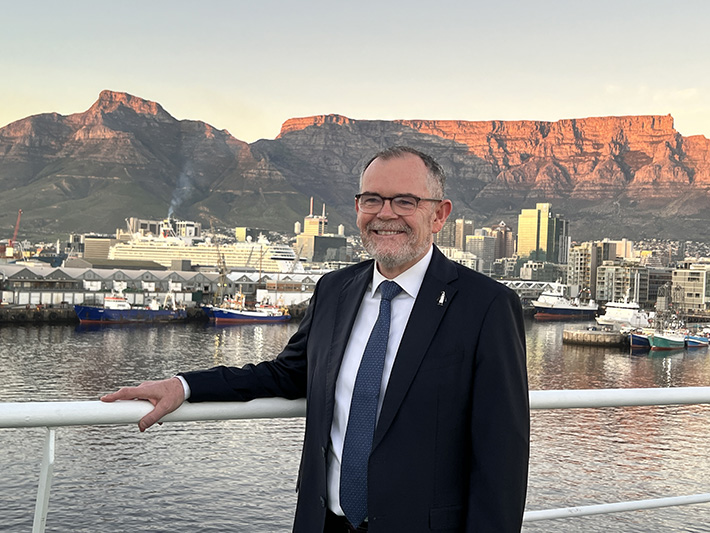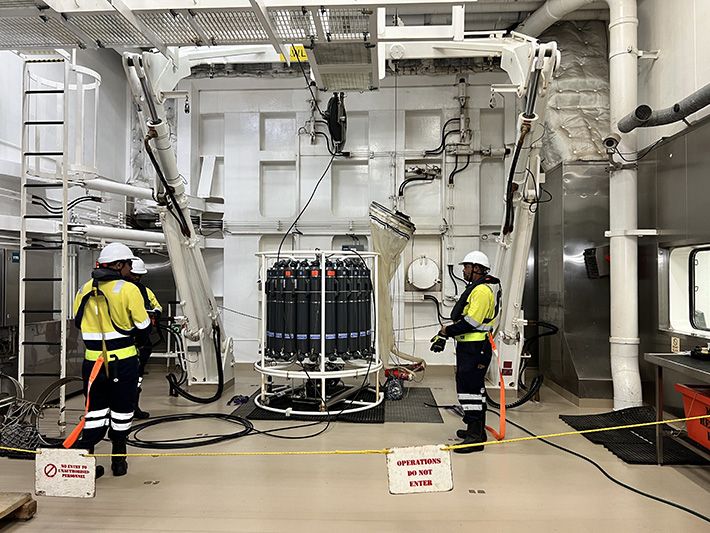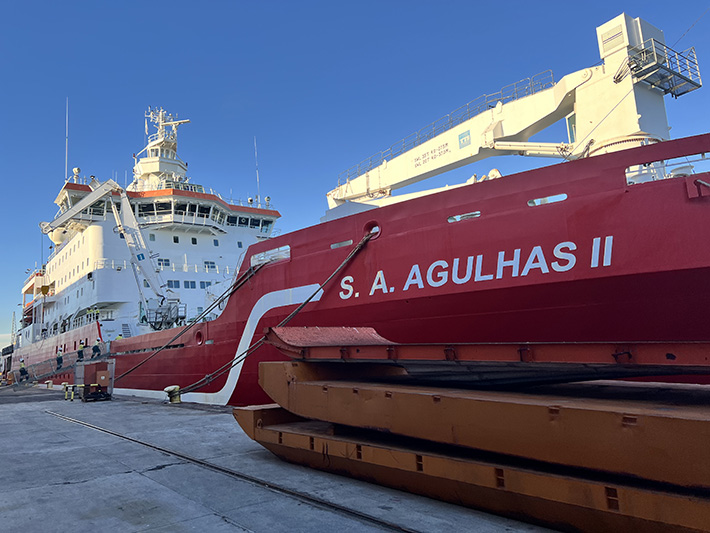Researching the Deep Blue

We want to prioritise research and development, because it’s the only way to grow the country.
Under the command of Ashley Johnson, the iron gate on the starboard side of the S.A. Agulhas II vessel opened slowly, and the paired bongo nets, supported by a mechanised framework, gradually sank 100 metres into the sea. After being towed for a while, they were retrieved, and scientists on board sampled the plankton collected for analysis. Simultaneously, the bongo nets also gathered data on temperature, salinity, conductivity, and depth. Following this, the scientists deployed Niskin bottles to collect water samples from various depths.
“By analysing the samples, we can calculate biomass abundance to determine how much plankton is present in that 100-metre stretch of water,” said Johnson, director of ocean research at South Africa’s Department of Forestry, Fisheries and the Environment (DFFE). “This is important because phytoplankton form the base of the marine food chain. If there is an abundance of phytoplankton, we can expect a high concentration of zooplankton, which feed on the phytoplankton. In turn, fish feed on zooplankton. So, if phytoplankton levels are low, it leads to fewer zooplankton, and ultimately fewer fish.”
This activity took place on 25 May, while the S.A. Agulhas II, South Africa’s icebreaking polar supply and research vessel owned by the DFFE, was travelling from Durban to Cape Town. The vessel had just returned from a mission to Marion Island, and berthed in Port of Durban 24 May for a public open day. More than 3,000 local residents came aboard to learn about the ship and its scientific missions, particularly its expeditions to South Africa’s research station in Antarctica.
The vessel began its new journey from Durban on 24 May, carrying crew, scientists, journalists, and officials from the DFFE, including Dion George, minister of forestry, fisheries and the environment. It arrived in Cape Town on 27 May. Along the route, a series of research activities were carried out.
The S.A. Agulhas II, with a length of 134.2 metres and a gross tonnage of 12,897, is the only polar research and oceanographic vessel in Africa. Since entering service in 2012, it has undertaken a series of polar and marine research missions that George proudly speaks of. “I am proud of the facility and the research we’re able to conduct. It’s world-leading, and we share it with the global community,” he told ChinAfrica. “We are the only African country with such a facility. We travel to Antarctica, and we carry out this work not just for Africa, but for the entire world.”
He expressed his satisfaction with the experiments conducted on board the vessel. “I was fascinated to see how they could collect samples directly from the ocean, and to find microplastics in them. We were then able to trace the origin of those plastics for inclusion in the global database. “That is particularly valuable for me, as it supports me in carrying out my duties as minister in the forthcoming plastics treaty negotiations and beyond. I had not fully realised that microplastics have found their way into everything. This experience has been incredibly valuable,” he said.
He also emphasised the significance of the open day held in Durban. “Our aim was to help people to understand the kind of scientific work we’re capable of in South Africa, and, of course, what our ship is capable of. Many South Africans are unaware of this national asset. The open day was part of our outreach, to foster pride in what we have,” he added.
On board the vessel, ChinAfrica did an exclusive interview with George, in which he shared his views on progress in ocean protection and South Africa’s cooperation with China in this field.

ChinAfrica: You have said that you are very proud of this facility. As a developing country, why is it important for South Africa to invest in research on oceans?
Dion George: Well, as we know, we face climate change, and we need information about it. Information is what’s needed to guide how we move forward. Without information, you are not prepared, because we need to mitigate and adapt. So the research we’re doing is obviously informing that process for us and for everyone else. Also, as a Global South country, with collaborations with many other countries, we are non-aligned – we are friendly with everybody. That places us in a very important position in the world.
Everyone wants to know what South Africa thinks geopolitically and what we are actually doing. So it’s good for us to be able to contribute something as well. We are not just taking. We also provide something to other countries, and they receive it from us. We believe that’s a very important reciprocal relationship.
What are the advantages of South Africa in this respect? And what contributions have been made?
Well, first, it costs a lot of money to run our South African National Antarctic Programme. Also, it’s very expensive to operate this ship. So, relatively speaking, as a country with a stagnant economy, it does put some pressure on our financial resources.
So we have to be quite creative with them. For example, we charter the vessel out. We’re also exploring other ways to generate income from the vessel, because it’s very important. We face huge complexities in our country regarding education and social issues.
So we have to try to balance those things. But it’s very clear that, as a government, we want to prioritise research and development, because it’s the only way to grow the country. We don’t want to neglect these efforts, or we will be left behind.
What I am hoping is that if we continue to invest in research and development, we might discover something that benefits the whole world. We want our population, especially young people, to be experimental – to test things, explore, and maybe find something new. That’s our aim. That is, in fact, how other countries operate. China, for example, is making great strides in research and development. That is how you lift your population out of poverty and into success.

There are many cooperation projects between China and South Africa. Can you talk about the projects related to environmental protection?
Well, I am very excited about the latest discussions we have been having with China, especially as we are now holding the G20 presidency.
My department is, obviously, responsible for countering illicit wildlife trafficking, and I have already been in discussion with the Chinese ambassador to South Africa, as well as my counterpart in China, to explore what we can do that shows our commitment.
For example, I’m working on a memorandum of understanding that I would like all nations to sign at the G20, committing ourselves to working together to fight poaching, which is a major issue in South Africa. The response from China has been very positive so far. We are in ongoing discussions.
We share common ground on many issues, and I am eager for our partners in China to assist us in tackling this serious challenge of poaching. To date, the discussions have been very promising.
The G20 Summit will be held in November in South Africa. This is the first time the summit is held on the African continent. What are your expectations for the outcomes of this summit?
We have set several key objectives for the G20, particularly around solidarity and inclusivity. It’s important for us to ensure that we emerge from these discussions with tangible outcomes. One of our major concerns, among others, is the cost of borrowing. As a developing country, we spend a significant amount of money on servicing debt, which we view as a serious risk.
Currently, our interest payments amount to R1.2 billion ($67 million) per day. If we could secure some form of support to reduce the cost of our current and future debt, it would significantly ease the pressure on our national balance sheet.
This is also why we are exploring mechanisms like carbon markets and their potential to relieve some of that financial burden. Persistently high interest payments will impact our development.
In my department, we are working in a number of areas in the Environment and Climate Sustainability Working Group, which I chair. Our focus areas include oceans and coasts, waste management, biodiversity and conservation, climate change, water security, and sustainability, among others.
What do you think of cooperation and exchanges in polar research as China also has five scientific research stations in Antarctica?
China has established several research stations in Antarctica, and I’m very keen to explore opportunities for collaboration. I haven’t yet had the chance to visit any of your stations, but I do plan to travel to Antarctica later this year.
When the summer season arrives, perhaps we can arrange an exchange – where I visit one of your research stations, and you in turn visit our base. China is conducting ground-breaking work in Antarctica. I believe we can actually collaborate on data collection and research because we have a team stationed at our base year-round.
I’m genuinely excited about what lies ahead.

The G20 is an important multilateral mechanism and South Africa is playing a key role during its presidency. However, it seems that the US is showing less interest in this year’s summit. It has also cut aid and even stopped some collaboration projects with South Africa. How does that impact your department? What are your expectations for the future cooperation between China and South Africa in the G20 and BRICS?
We did lose some funding from the US. For example, Peace Parks lost their funding, but we were able to provide some financial support through SANParks – South African National Parks – to help them to continue their work. Also, we lost all funding for our Fusion Centre, which serves as our primary intelligence-gathering mechanism.
China very graciously offered to assist us during a challenging time. Fortunately, we were able to manage the situation, but we were truly grateful for the offer of support.
It was good to see that, in a moment of difficulty, our friend China stepped forward and said, “We want to help because we understand this difficulty.” That meant a great deal to us, and we are sincerely appreciative.
There was a conversation between US President Trump and President Ramaphosa, during which our president encouraged the US president to attend the G20, as is customary. But we are not certain whether he will. He has previously indicated that he would not, but as we work to reset and strengthen our relationship, he may reconsider. It is important that the G20 presidency will be handed over to the US next year. But regardless of the US decision, we continue to move forward with our priorities and preparations.
We are not beholden in any way for how we conduct our work. If the US is with us, that’s great – we will be very pleased and we really want that. But if not, we will still proceed. For example, on biodiversity and conservation, there remains strong interest, and we believe we share meaningful, mutual interests with the US and others. The bottom line for us is that we are very excited to be hosting the G20.
This is the first time the G20 is being hosted on African soil, and the first time in South Africa. We are proudly a Global South country and a developing economy. We continue moving forward because we are friends with everyone. We are non-aligned, and we do not like to be told who we can be friends with and who we cannot. I think that is very important to us and for our national sovereignty.
 Facebook
Facebook
 Twitter
Twitter
 Linkedin
Linkedin
 Google +
Google +










